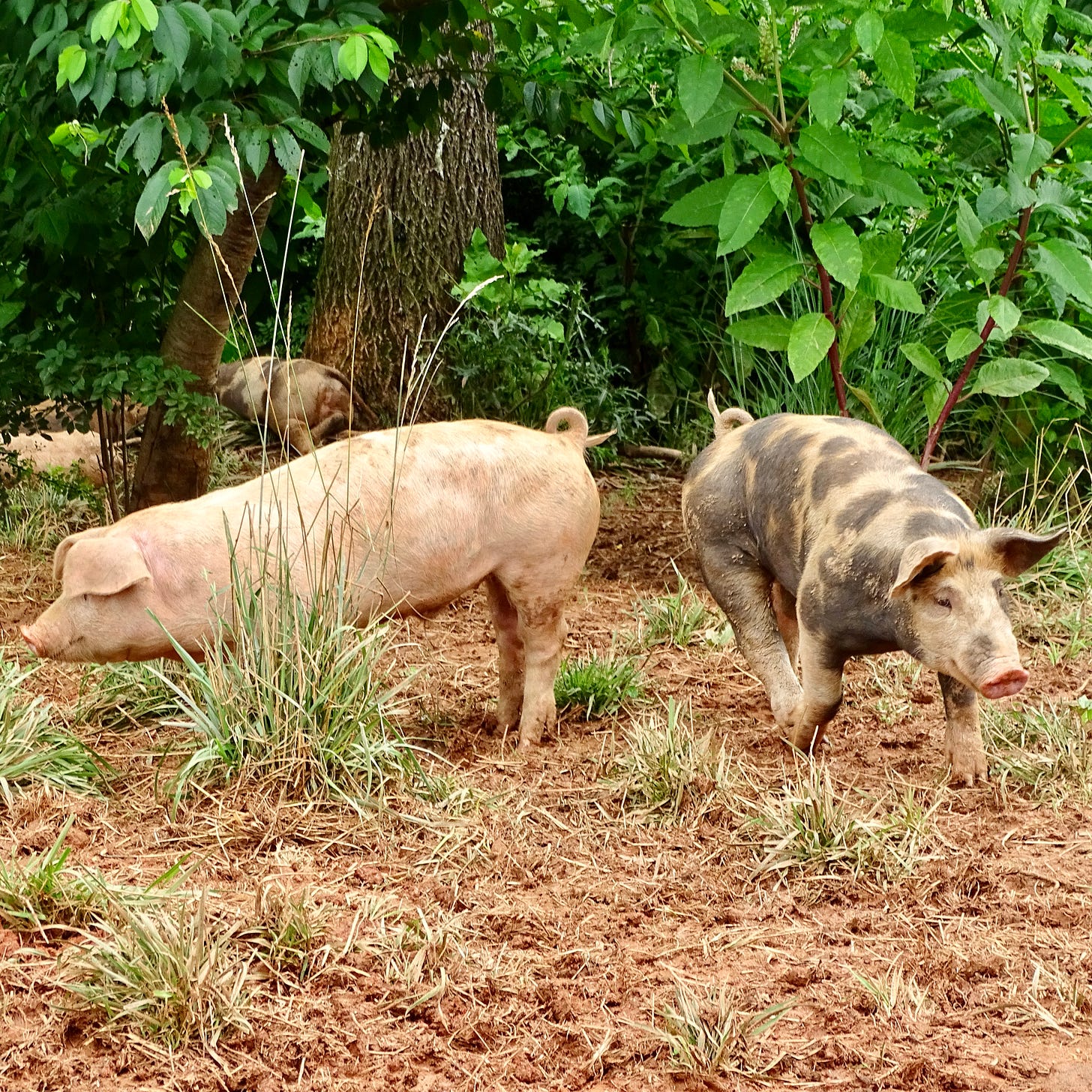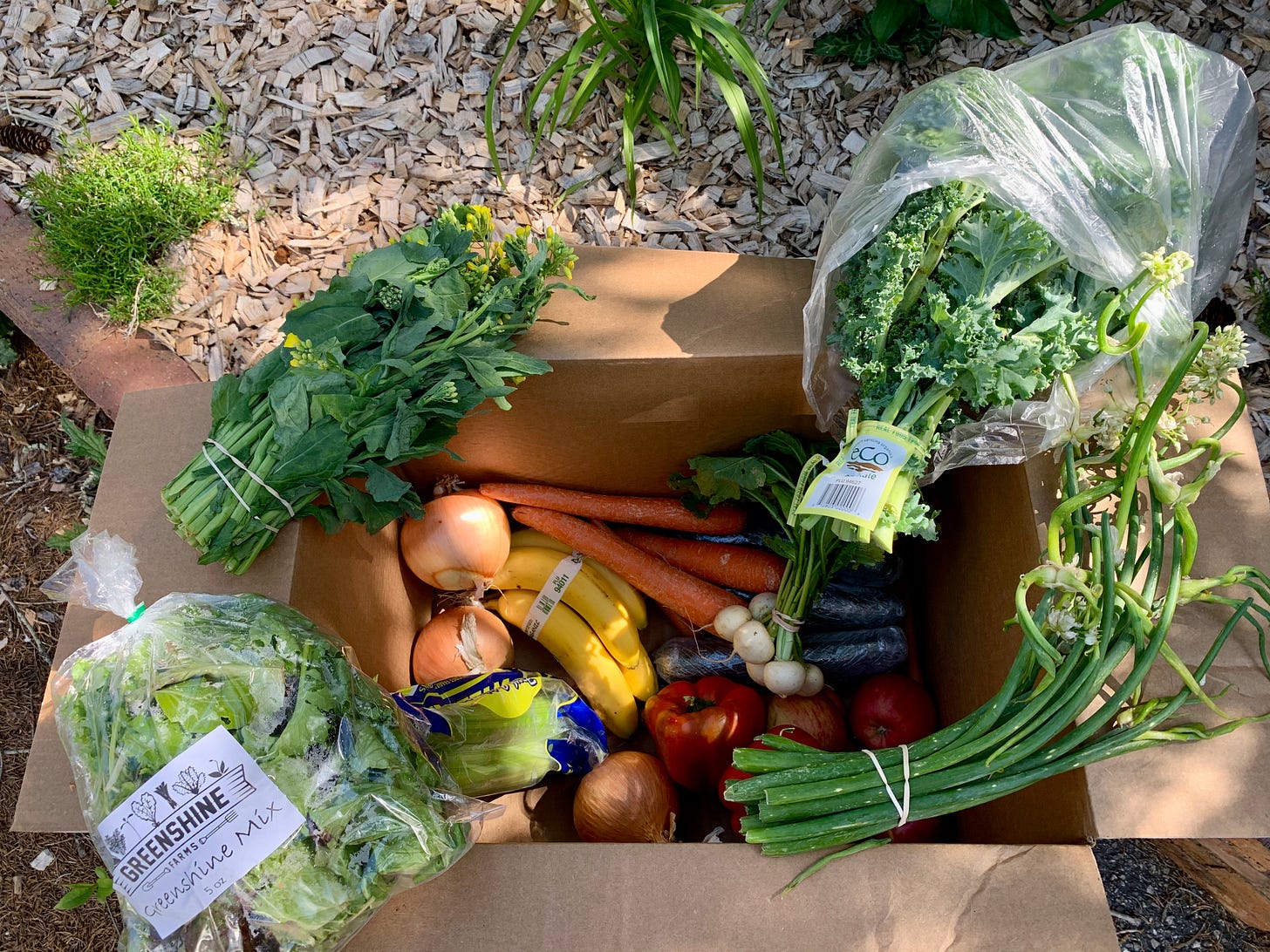After ten years of staring into thousands of pig eyes, I’ve come to understand they’re never vacant. There’s always somebody looking back at me.
I’ve taken two thousand pigs to the slaughterhouse, and I’ve become haunted by the ghosts of those pigs. I don’t want to have power to decide whether someone lives or dies anymore.
Bob Comis, farmer & poet
There was no end in sight to the pandemic. But as the world lurched from one variation of the virus to another one, films that had already been made continued to come in and filmmakers were still asking me to help them get their films on the air across the country.
One of them was The Last Pig by filmmaker Allison Argo. Known for her intimate portraits of endangered animals, many of Allison’s films have been broadcast by PBS and National Geographic and have reached audiences worldwide. Altogether, her films have won over 100 awards internationally, including six national Emmys, a duPont-Columbia Award, plus awards at Jackson Hole, Banff, and dozens of other film festivals from New Zealand to Japan. Hundreds of thousands of people have seen her work.
Seen through the eyes and words of one small farmer, Bob Comis, as he questions his own beliefs and the value of life, the film offers a glimpse into how animal agriculture in America may be changing. Comis finds each individual pig so intelligent and compelling that having them killed feels like an act of betrayal.
Musician Moby, a well-known vegan, described The Last Pig as, “Startling, honest and deeply beautiful.”
The two-minute trailer for The Last Pig brought me to tears. It was a hero’s journey of a different sort and one I couldn’t resist.
The Last Pig especially resonated with me as one of my favorite adventures where I lived was “Farm Tour.” Each year, many of the farms in the mountains surrounding Asheville opened up to the public for a weekend. Grownups and kids can see where our food comes from, learn how animals are cared for, and find out about other agricultural splendors such as raising Alpaca goats for their wool, growing flowers for weddings and other occasions, and cultivating hops for craft beers. Many of Asheville’s restaurants proudly display their farm-to-table credentials on their menus.
But when the world stopped for the pandemic, grocery store shelves were empty and everything shut down – including restaurants – it was our local farmers who came to our rescue. Actually, we rescued each other.
Founded in 2012 by Andrea and Graham Duvall, an organization called Mother Earth Food swung into action acting as a bridge between area farmers and the community. Soon they were making weekly home deliveries of bins filled with fresh produce, dairy, eggs, baked goods, hummus, chocolate, meat and veggie proteins, coffee and more – all of it regionally sourced.
“When restaurants in Western North Carolina closed March 17,” wrote Mountain XPress, “a window of opportunity opened for Mother Earth Food. The Asheville-based produce and grocery delivery service suddenly found itself able to fold more partners and customers into its mission: making it easier for people to eat local, organic food while supporting the businesses that provide it.”
Morning journal, 22 March 2020 – Solid sleep for once last night – there was no Coronavirus in my dreamscape and for that, I am grateful. I took a drive out into the mountains west of Asheville in search of an organization that is selling boxes of produce from the farmers, produce they can no longer sell to restaurants becasue they’ve all closed.
It took me awhile to find the distribution point, hidden away as it was behind a bunch of scary looking abandoned greenhouses with broken glass and trees growing inside of them – nothing to do with the pandemic, but still creepy. I drove down the dirt road to an open building surrounded by still more old greenhouses. Three people stood outside. As I pulled up in my car (they ask you not to get out), a tall attractive, slender guy in blue jeans and a work shirt, his long grey hair pulled back in a pony tail, peered in my open passenger side window. He had friendly blue eyes. He smiled at me.
“You’re in luck!” he said. “You got the last box!”
I was close to tears at this point. Tears of exhaustion and tears of appreciation for what these lovely people are doing as the go-betweens between local farmers and the people in the community who need food.
“We LOVE what we do!” he said when I thanked him and handed him the $20. “Thank YOU for coming out to get our fresh produce!”
I was never so thankful that I was living in a mountain town surrounded by farms, farmers and a plentiful supply of fresh water. Each week, I drove out to the Mother Earth greenhouses to collect a produce box from Mother Earth. Whatever was in the box determined what I would cook or bake that week. Some things were not familiar to me and I had to ask friends what they were and how to prepare them.
When I think back on those farm boxes, it’s good feelings I remember – not the frightening atmosphere of the pandemic.
Allowing yet another film to direct my life, The Last Pig was a reminder that it wasn’t hard to go back to a meatless routine. When the kids were younger, I’d stopped eating meat for seventeen years but then drifted back into it sometime after moving to Asheville.
Moved by Bob Comis’s thoughts and emotions, as well as the beautiful camerawork of Joseph Brunette, an award-winning National Geographic cinematographer, I once again stopped eating meat (although I still eat fish.)
Allison has gently pointed out to me that fish are sentient beings, too. I liked Allison and wanted to make her happy, so I made an inner bargain with myself: if I am ever pitched a beautiful film about fish, I’ll take that as a sign and give them up, too.
Kristin Fellows is a published writer, a world traveler, and a well-seasoned documentary film consultant. This tale comes to you from a small farming village in Portugal, where she is still surprised to find herself living. She continues to eat fish, because it’s hard not to in Portugal, and appreciates the many gifts of produce her farming neighbors bring to her.
More about Kristin @ kristinfellowswriter.com







We slaughtered and butchered our own animals on grandparents' farm when I was a kid and I dare you to look into the eye of a steer, sheep or pig and not see fear, partly your own. My Dad and Mom started their life together operating their own butcher shop ( Ok, meat market) and grocery store in West Manchester, Ohio. I came into their world 6 years later but they still helped the farm to produce meat for at least 4 of our families and more. My Dad moved on to a career in wholesale groceries. And you should have seen my grandmother kill one of her beloved chickens, will spare you those details, then after putting it through a bucket of scalding water and picking off every smallest pin feather, bake and serve it up for Sunday dinner for about a dozen of us. She kept a flock of 60--80 egg layers. Better keep laying them eggs, ladies, because she knew who was finished and so they were having served out their time. Now you have made me want to go see that first Temple Grandin movie where she figures out how to build the cattle shute. She sees things we miss.
Thanks. I have a background that was full, richly rewarding, often challenging. I may have had more experiences that a lot of people have and my kids and I talked about some of this recently, lots of love and laughter, tears and common concerns. Stories, and on some topics, like this one, that would surprise some people. How about witnessing your first post-mortem at age 16, with your girlfriend's physician Dad doing the work? That was a doozie, as I had not heard about involuntary muscle movements (cadaveric spasm) after being dead for awhile and moving the body. Scared the bejeezus out of me!